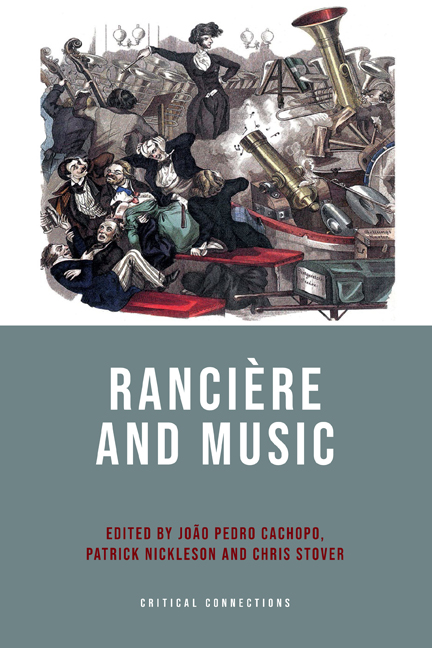Book contents
- Frontmatter
- Contents
- List of Examples
- Acknowledgements
- Notes on Contributors
- Introduction
- Part I: Music and Noise
- 1 Musique concrète and the Aesthetic Regime of Art
- 2 ‘Rip it up and start again’: Reconfigurations of the Audible under the Aesthetic Regime of the Arts
- 3 A Lesson in Low Music
- Part II: Politics of History
- 4 Wandering with Rancière: Sound and Structure under the Aesthetic Regime
- 5 Staging Music in the Aesthetic Regime of Art: Rancière, Berlioz and the Bells of Harold en Italie
- 6 Rancière on Music, Rancière’s Non-music
- 7 Coloured Opera and the Violence of Dis-identification
- Part III: Politics of Interaction
- 8 Musical Politics in the Cuban Police Order
- 9 Rancière and Improvisation: Reading Contingency in Music and Politics
- 10 Rancière’s Affective Impropriety
- Part IV: Encounters and Challenges
- 11 Rancière, Resistance and the Problem of Commemorative Art: Music Displacing Violence Displacing Music
- 12 Stain
- 13 On Shoemakers and Related Matters: Rancière and Badiou on Richard Wagner
- 14 Roll Over the Musical Boundaries: A Few Milestones for the Implementation of an Equal Method in Musicology
- Afterword
- A Distant Sound
- Works Cited
- Index
9 - Rancière and Improvisation: Reading Contingency in Music and Politics
Published online by Cambridge University Press: 03 October 2020
- Frontmatter
- Contents
- List of Examples
- Acknowledgements
- Notes on Contributors
- Introduction
- Part I: Music and Noise
- 1 Musique concrète and the Aesthetic Regime of Art
- 2 ‘Rip it up and start again’: Reconfigurations of the Audible under the Aesthetic Regime of the Arts
- 3 A Lesson in Low Music
- Part II: Politics of History
- 4 Wandering with Rancière: Sound and Structure under the Aesthetic Regime
- 5 Staging Music in the Aesthetic Regime of Art: Rancière, Berlioz and the Bells of Harold en Italie
- 6 Rancière on Music, Rancière’s Non-music
- 7 Coloured Opera and the Violence of Dis-identification
- Part III: Politics of Interaction
- 8 Musical Politics in the Cuban Police Order
- 9 Rancière and Improvisation: Reading Contingency in Music and Politics
- 10 Rancière’s Affective Impropriety
- Part IV: Encounters and Challenges
- 11 Rancière, Resistance and the Problem of Commemorative Art: Music Displacing Violence Displacing Music
- 12 Stain
- 13 On Shoemakers and Related Matters: Rancière and Badiou on Richard Wagner
- 14 Roll Over the Musical Boundaries: A Few Milestones for the Implementation of an Equal Method in Musicology
- Afterword
- A Distant Sound
- Works Cited
- Index
Summary
In this essay, I want to attempt a kind of Rancièrean double movement: to reflect on the politics of improvisation as well as the improvisation of politics. The impetus behind this approach originates in what appears to me a correspondingly double lack. On the one hand, while political interpretations of improvised music are appearing with more frequency, Rancière's interventions into the notion of politics have not appeared in these conversations. On the other hand, while one of Rancière's central concerns involves showing the ‘contingency of any order’, his precise focus on the contingency of the police tends to obscure ‘smaller’ contingencies such as improvisation. The moments in history that rupture the sensible appear in Rancière as quasi-transcendental events, or, as Giuseppina Mecchia puts it, they occur ‘between historicity and event’. How these ruptures come into being has always been less of a concern for Rancière, and it is here that I think improvisation can raise productive questions. My goal is not so much to arrive at a better reading of Rancière (the notion of a ‘proper’ reading being anyway anti-egalitarian) as it is to better reflect on the relationships between agency, subjectivity and contingency within a police order.
The politics of improvisation
Rancière's interventions into the notion of politics challenge us to consider the efficacy of actions that take place as a function of an already established or given way of doing. Rancière's politics is opposed to the police, which is any pre-existing order of doing and being. In a given police order, people are organised into their ‘proper’ places according to the ‘logic’ of the system, and as such, controverting actions that take place as a function of that system do not constitute politics so much as they remain paths of dissent that are ‘appropriate’ to those dissenting. In their appropriateness, such methods can always be managed, mitigated or redirected. Politics, by contrast, occurs in the moments that ‘rupture the sensible’, redistributing not only the sense of what is and is not appropriate, but also the presupposition of the existence of appropriate positions. Locating politics in improvisation would thus involve locating a situation in which a given improvisation produced a redistribution of sense, through which new ways of doing or being would be allowed to emerge.
- Type
- Chapter
- Information
- Ranciere and Music , pp. 207 - 229Publisher: Edinburgh University PressPrint publication year: 2020



